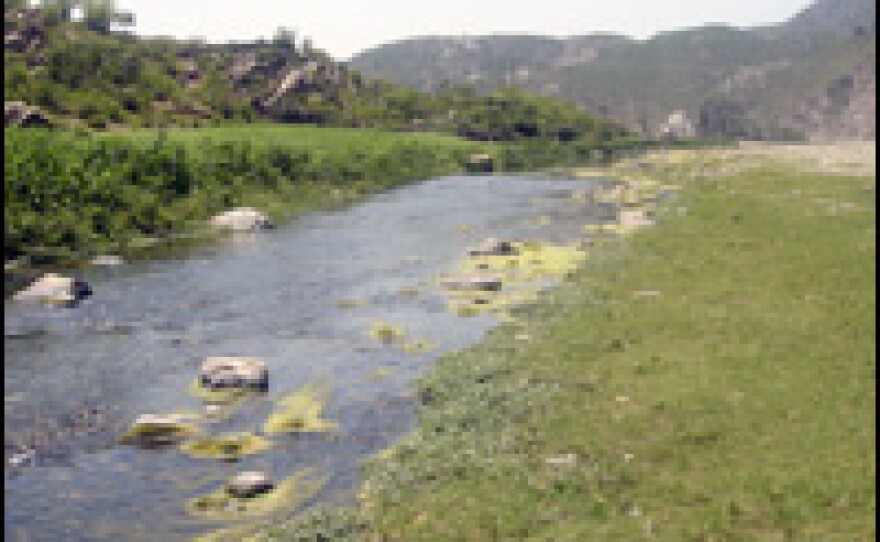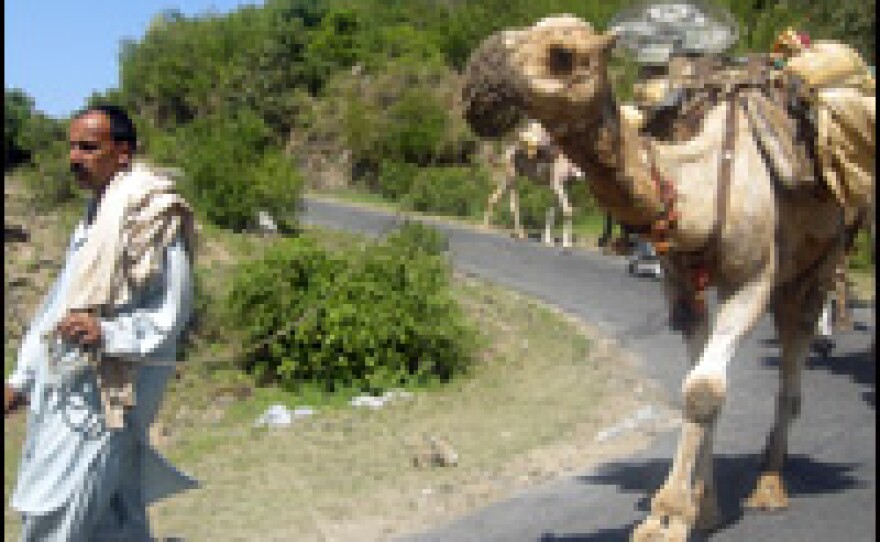
Pakistan's army said Saturday that troops killed more than 150 Taliban militants during an operation to dislodge the extremists from the northwestern district of Buner. Thousands of residents have fled for safety in the past five days of fighting.
People are piling into cars, onto tractors and even camels to escape the siege.
An electric fan swings from the hump of one beast of burden that heaved under the weight of hastily packed possessions. Withering heat is taking a toll on the displaced population, and local relief workers say the refugees lack clean water, provisions and housing.
Travel is slow through the treacherous mountain roads that snake through the valleys and streams of Buner. Signs of the conflict mar the sweeping scenery. Atop the peak of the village of Durmai, young men scavenge in the bombed-out wreckage of a police station destroyed by Taliban militants.
The distant thud of a shell sets off urgent warnings to travelers on the road below.
"The bombardment is going on," yells a breathless young boy. The military is relying heavily on artillery and airstrikes to hit the Taliban, which has taken the high ground in the mountains.
The militants pushed into Buner last week from their stronghold in the neighboring Swat Valley. Locals point out spots on the roadside where militants planted explosives to slow the army's advance.
Pakistan's military says troops secured the Ambela Pass, a strategic ridge that overlooks a southwestern portion of Buner, after fierce resistance. But the operation to flush out the militants has also sown confusion and panic. Mohammad Nawaz is desperate for word from his family. The bearded young student, who studies in Islamabad, is making the hazardous journey to return home.
"I haven't read in the newspaper that my village has been bombed, but there's been shelling in Ambela nearby, so naturally I am worried," he says. "I have come back with all my books and bags. How can I prepare for exams? If we die, we will die together. Such are Pakistan's circumstances."
Nawaz says the government has betrayed the people of Buner by failing to stop the Taliban. He says the local population held three jirgas — or meetings of elders — and decided against allowing the Taliban to enter.
"They should not have been allowed to come in," Nawaz says. "They should have been controlled, if they were controllable, that day. At that time, people were with the government. But what was the government doing then? And why is the army coming a week after the militants, without any notice or chance to evacuate?" He apologizes for being bitter.
The army says it has killed scores of Taliban. A 72-year-old man who asks to be identified as Mahmoud says army shelling in his now-deserted village of Ambela has killed civilians as well.
"A cannon shot hit a house of our neighbor and ripped their horse in half," he says. "It wasn't possible to collect all the body parts of their son. ... What kind of injustice is this? The government is killing Muslims to please the United States."
Mahmoud was a man of means and influence in his village. He says his family is now homeless. He struggles to speak, choking back tears that he says are for all the suffering.
"People are ruined, women widowed, children orphaned, the cattle dead," he says. "There is no electricity, no water, and it is so pitch dark it's as if there is no one in this land."
In impoverished Buner, farmers in midharvest have abandoned their fields. Local hospitals report tending to wounds from assault rifles.
Producer Junaid Kahn contributed to this report from Buner.
Copyright 2022 NPR. To see more, visit https://www.npr.org. 9(MDAzMjM2NDYzMDEyMzc1Njk5NjAxNzY3OQ001))







